
Becky Sharp is a 1935 American Technicolor historical drama film directed by Rouben Mamoulian and starring Miriam Hopkins who was nominated for the Best Actress Oscar. Other supporting cast were William Faversham, Frances Dee, Cedric Hardwicke, Billie Burke, Alison Skipworth, Nigel Bruce, and Alan Mowbray.

Ida Lupino was a British actress, director, writer, and producer. Throughout her 48-year career, she appeared in 59 films and directed eight, working primarily in the United States, where she became a citizen in 1948. She is widely regarded as the most prominent female filmmaker working in the 1950s during the Hollywood studio system. With her independent production company, she co-wrote and co-produced several social-message films and became the first woman to direct a film noir, The Hitch-Hiker, in 1953.
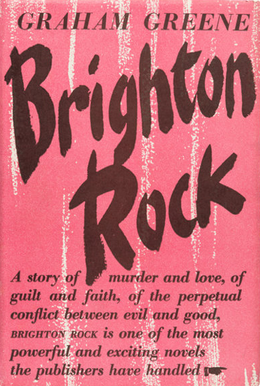
Brighton Rock is a novel by Graham Greene, published in 1938 and later adapted for film and theatre. The novel is a murder thriller set in 1930s Brighton. The first of Greene's works to explore Catholic themes and moral issues, its treatment of class privilege and the problem of evil is paradoxical and ambivalent.

The Trouble with Angels is a 1966 American comedy film about the adventures of two girls in an all-girls Catholic school run by nuns. The film was the final theatrical feature to be directed by Ida Lupino and stars Hayley Mills, Rosalind Russell, and June Harding.

Henry William George Lupino professionally Lupino Lane, was an English actor and theatre manager, and a member of the famous Lupino family, which eventually included his cousin, the screenwriter/director/actress Ida Lupino. Lane started out as a child performer, known as 'Little Nipper', and went on to appear in a wide range of theatrical, music hall and film performances. Increasingly celebrated for his silent comedy short subjects, he is best known in the United Kingdom for playing Bill Snibson in the play and film Me and My Girl, which popularized the song and dance routine "The Lambeth Walk".

Big Brown Eyes is a 1936 American comedy crime film directed by Raoul Walsh and starring Cary Grant, Joan Bennett and Walter Pidgeon. It was produced by Walter Wanger and distributed by Paramount Pictures.

The Milky Way is a 1936 American comedy film starring Harold Lloyd. Directed by comedy veteran Leo McCarey, the film was written by Grover Jones, Frank Butler and Richard Connell based on a play of the same name by Lynn Root and Harry Clork that was presented on Broadway in 1934.
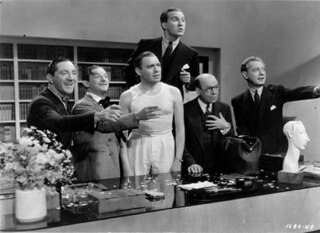
Artists and Models is a 1937 black-and-white American musical comedy film, directed by Raoul Walsh and starring Jack Benny and Ida Lupino. It was produced by Lewis E. Gensler.

Sleep, My Love is a 1948 American noir film directed by Douglas Sirk. It features Claudette Colbert, Robert Cummings and Don Ameche.

Anything Goes is a 1936 American musical film directed by Lewis Milestone and starring Bing Crosby, Ethel Merman, Charles Ruggles and Ida Lupino. It is based on the 1934 stage musical Anything Goes by Guy Bolton and P. G. Wodehouse, which included songs by Cole Porter.

The Gay Bride is a 1934 gangster film-screwball comedy starring Carole Lombard as a wisecracking gold-digger and Chester Morris as the poor man she despises. It was directed by Jack Conway and written by the husband-and-wife team of Sam and Bella Spewak, based on the story "Repeal" by Charles Francis Coe.

La Fiesta de Santa Barbara is a 1935 American comedy short film directed by Louis Lewyn. It was nominated for an Academy Award at the 9th Academy Awards in 1936 for Best Short Subject (Color). It features a young, pre-stardom 13-year-old Judy Garland singing "La Cucaracha" with her two sisters.
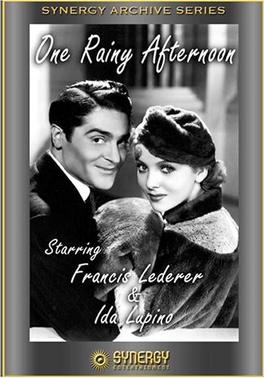
One Rainy Afternoon is a 1936 American romantic comedy film directed by Rowland V. Lee, starring Francis Lederer and Ida Lupino, and featuring Hugh Herbert, Roland Young and Erik Rhodes. It also marked the last film appearance by actress Florence Lawrence, who died in 1938, who had an uncredited bit role in the film. It was written by Stephen Morehouse Avery, with additional dialogue by Maurice Hanline, from the screenplay for the 1935 French film Monsieur Sans-Gêne by Emeric Pressburger and René Pujol, which was based on the story "The Satyr" by Pressburger. The film was reissued in 1948 as Matinee Scandal.
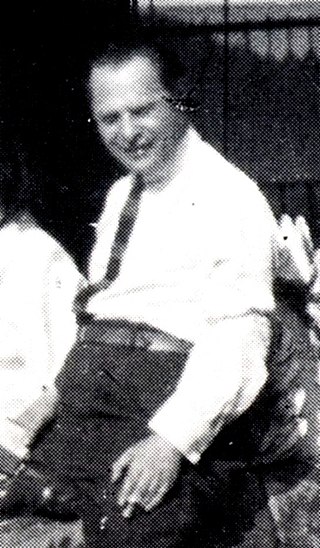
Leo Birinski was a playwright, screenwriter and director. He worked in Austria-Hungary, Germany and in the United States. As a playwright in Europe, he gained his biggest popularity from 1910 to 1917 but was ultimately forgotten. From the 1920s to 1940s he worked mainly as a screenwriter, first in Germany, later in the United States, to which he emigrated in September 1927. In the United States, he also returned to writing stage plays. He wrote in German and English. Until recently, only a minimal amount of information about his life has been available. Complicating matters, there have been many legends and rumours concerning Birinski's person, including the false report of his "suicide" in 1920 that found its way from newspaper obituaries into encyclopedias.

If You Could Only Cook (1935) is a screwball comedy of mistaken identity starring Herbert Marshall as a frustrated automobile executive and Jean Arthur as a young woman who talks him into posing as her husband so they can land jobs as a butler and a cook.

Nino Martini was an Italian operatic tenor. He began his career as an opera singer in Italy before moving to the United States to pursue an acting career in films. He appeared in several Hollywood movies during the 1930s and 1940s while simultaneously working as a leading tenor at the Metropolitan Opera in New York City.

Paris in Spring is a 1935 black and white musical comedy film directed by Lewis Milestone for Paramount Pictures. It is based on a play by Dwight Taylor, with a screen play by Samuel Hoffenstein and Franz Schulz.

Love Me Forever is a 1935 American drama film directed by Victor Schertzinger. The film was nominated for an Academy Award for Best Sound Recording.

The World's in Love is a 1935 Austrian comedy film directed by Viktor Tourjansky and starring Mártha Eggerth, Leo Slezak and Ida Wüst. It is based on the operetta Clo-Clo. The film's sets were designed by the art director Julius von Borsody. It was remade in Britain the following year as Dreams Come True.
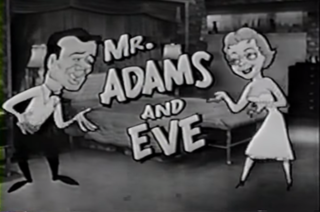
Mr. Adams and Eve is an American situation comedy television series about a married couple who are both movie stars. It stars Howard Duff and Ida Lupino and aired on CBS from January 4, 1957, to July 8, 1958.




















